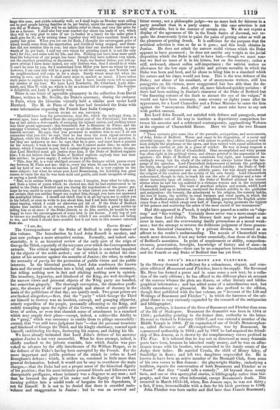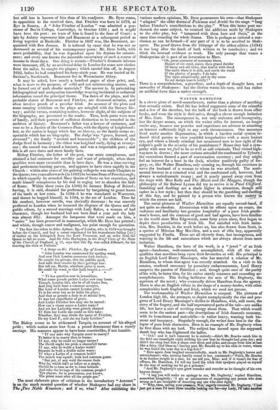MR. DYCE'S BEAUMONT AND FLETCHER.
IF the library demand is sufficient for a voluminous, elegant, and com- plete edition of Beaumont and Fletcher, here is the supply. The Reverend Mr. Dyce has formed a purer and in some sense a new text, by a colla- tion of the early editions ; he has affixed to the different plays an account of the sources whence the plots are drawn, or other literary and biblio- graphical information ; and has added notes of a miscellaneous cast, but chiefly emendatory or glossarial. He has also prefixed to the edition, though first published with the last volume, an "Account of the Life and Writings of Beaumont and Fletcher " ; in which the bareness of the ori- ginal theme is very curiously expanded by the research of the antiquarian and bibliographer. Less, perhaps, is known of the lives of Beaumont and Fletcher than even of the life of Shakspere. Beaumont the dramatist was born in 1584 or 1586; probability pointing to the former date, authority to the latter. He went to Oxford in February 1596-7, and was entered a member of the Middle Temple in 1600. If an expansion of one of Ovid's Metamorphos7 es, called Salmacis and Hermaphroditus, was by Beaumont., he commenced authorship in 1602 ; and by 1607 he had acquired the friendL ship of Ben Jonson, as is shown by the complimentary verses prefixed to The For. It is inferred that he was not so distressed as many dramatic poets have been, because he inherited ready money, and he was on affec- tionate terms with his brother, who succeeded to the family estate of the Judge their father. He married Ursula, the child of Henry Isley, of Sundridge in Kent; and left two daughters unprovided for. He is known to have been an active member of the Mermaid Club, from some of his own verses to Ben Jonson : the playwright Shirley, embodying a tradition, reports the conversation of both Beaumont and Fletcher as so " fluent " that they "could talk a comedy." All beyond these scanty facts, and one or two apocryphal stories, is bibliography rather than bio- graphy, and that very often inferential, except Beaumont's death. This occurred in March 1615-16, when, Ben Jonson says, he was not thirty a fact, if true, irreconcileable with a date for his birth previous to 1586.
John Fletcher was born earlier and died later than Francis Beaumont;
but still less is known of him than of his coadjutor. - Mr. Dyce states, in opposition to the received date, that. Fletcher was born in 1579, at Rye in Sussex. A " John Fletcherof London ". was admitted a pen7 sioner of Ben'et College, Cambridge, in October 1591 ; and it might have been the poet: no trace of him is found in the Inns of Court : a tale by Aubrey represents hint and Beaumont at a subsequent period as living together at Bankaide. Fletcher in .1607 was, like Beaumont, ac- quainted with Ben Jonson. It is inferred by some that he was not so distressed as several of his contemporary poets : Mr. Dyce holds with More probability, that he was dependent upon his dramas for subsist- ence; and every one knows the miserable uncertainty of such a source of income in those days. One thing is certain—Fletcher's dramatic labours were incessant, till, by an accidental delay in London for some new clothes from the tailor, be caught the plague; which carried him off, in August 1625, before he had completed his forty-sixth year. He was buried at St. Saviour's, Southwark. Beaumont lies in Westminster Abbey.
It may be asked, how nearly a hundred pages of close print, and, what is more to the purpose, of solid and not uninteresting matter, can -be formed out of such slender materials? The answer is, by painstaking bibliographical and antiquarian knowledge weaving incidental or collateral information round the principal theme. The dates of the playa, and the probable shares of Beaumont and Fletcher, are discussed seriatim, and often involve proofs of a peculiar kind. An account of the plots and some runnino.
ry criticism on the plays are mingled with the literary his-
to ; and thee verses, containing notices, however slight, of the subjects of the biography, are presented to the reader. Then, both poets were men of family, and their parents of sufficient distinction to be recorded in the archives of history. Beaumont's father was a lawyer of eminence, and rose to be a Justice of the Common Pleas, with the dignity of knighthood : but, as the nation is happy which has no history, so the family seems re- spectable which has no biography. The Judge was "grave, learned, and reierend " ; the family "ancient and honourable " ; the children of the Judge lived in harmony ; the eldest was knighted early, dying at twenty- oar ; the second was created a baronet, and was a respectable poet ; and this is all save dates and mere family facts.
Bishop Fletcher, the father of the poet, was more conspicuous, and attained a bad eminence for servility and want of principle, when those qualities were more excusable than in later days. He was a time-serving and preferment-hunting parson, and appears to have risen rapidly in the Church : within nine years of his quitting college he was made Chaplain to the Queen; two years afterwards (in 1583) he became Dean of Peterborough; in which capacity he attended Mary Queen of Scots on her execution, and made himself conspicuous by his zeal in urging her to abandon the faith of Rome. Within three years (in 1589) he became Bishop of Bristol; having, it is said, obtained the preferment by bargaining to grant leases of the lands at low rents. In 1692-3 he was translated to Worcester, and thence he begged himself, in 1594, to the see of London. Thus far his conduct, however servile, was clerically decorous : he was scarcely preferred to London when he incurred the disgrace of the Queen and the public odium, by a second marriage with Lady Baker, a woman of bad character, though her husband had not been dead a year and the lady was almost fifty. Amongst the lampoons that were made on him, a "satire " has been preserved in manuscript, which Mr. Dyce has printed ; and which, though coarse and malignant, has point enough for quotation.
" The first line refers to John Aylmer, Bp. of London, who in 1579 was brought before the Council, and had a smart reprimand for his immoderate falling [sic] of timber on the bishoprick from the Lord Treasurer, and an order from the Queen to fall no more. And Sir John Harington, in his Brie/ View of the State of the Church of England, p. 19, says that this Bp. was called Elinor?, for his marring the elms at Fulham."•
"A Satyr on Ri : Fletcher, Bp. of London.
" John London was condemned for spoiling wood, And now Dick London commons cloth enclose; He sought his private, this the publike good, And both their credits by their gettings lose: But tell me, Martin, whethers gains is more,
He maid the wood, or this hath bought a —?"
" Yt is a question now in heranldrye,
What name proude prelate Ladye now may beare. Though, London like, she be of all trades free, And long bath bone a common occupier,
Her Lord of London cannot London give; Yt is his owne but as he holds his place;
And that so proude a foole in yt should lyre, Yt was but superfluitie of grace. And Ladye Fletcher less may she be named: How can a vicars sonne a Ladye make?
And yet her Ladyship were gretely shamed Yf from her Lorde she could no title take:
Wherfore, they may divide the name of Fletcher, He ray Lord F, and she my Lady Letcher."
The Bishop seems to be nicknamed Tarquin on account of his alleged .pride; which notion arose less from a proud demeanour than a stately carriage. His manners appear to have been courtierlike, if not humble.
"Yf any aske why Tarquin meat to marry? Yt better is to marry then to borne: Yf any, why he could no longer tarrye? The Devil' ought his pride a shamefull tutee: Yf any, why he wolde a Ladye wedd? Because he wold a double miter weere: Yf whye a Ladye of a common bedd?
The match was squall; both had common gears.
"But yet, yf any weld the reason finds Why he which lok't as loftye as a staple, Should be so base as for to come behinds And take the levings of the common people? 'Tys playne; for in processions, you knowe, The priest must after all the people goo."
The most elaborate piece of criticism in the introductory " Account" is on the much mooted question of whether Shakspere had any share in The iTwo Noble Kinsmen ; and if so, what ? After exhibiting the various modern opinions, Mr. Dyce pronounces his own—that Shakspere "adapted" the older drama of Palemon and Amite for the stage "long before Fletcher's contributions to the play." When this latter poet un- dertook the same subject, he retained the additions made by ..Sliakspere to the older play, but " tampered with thim here and there," at the same time recasting the whole drama. This is perhaps as rational a con- clusion as can be formed—if any part of it is to be ascribed to Shak- spere. The proof drawn from the titlepage of the oldest edition (1634) is too long after the death of both writers to be 'conclusive;' and we think the internal evidence as weak. The only passage that wears a Shakaperian air is part of an invocation to Mars.
" Oh, great corrector of enormous times, Shaker of o'er-rank states, thou grand decider Of dusty and old titles, that heal st with blood The earth when it is sick, and curet the world 0' the plurisy of people; I do take Thy signs auspiciously, and in thy name To my design march boldly!"
There is a comprehension, a grandeur, and a depth of thought here, not
unworthy of Shakspere : but the diction wants his ease, and has rather an artificial force than a native strength.



























 Previous page
Previous page